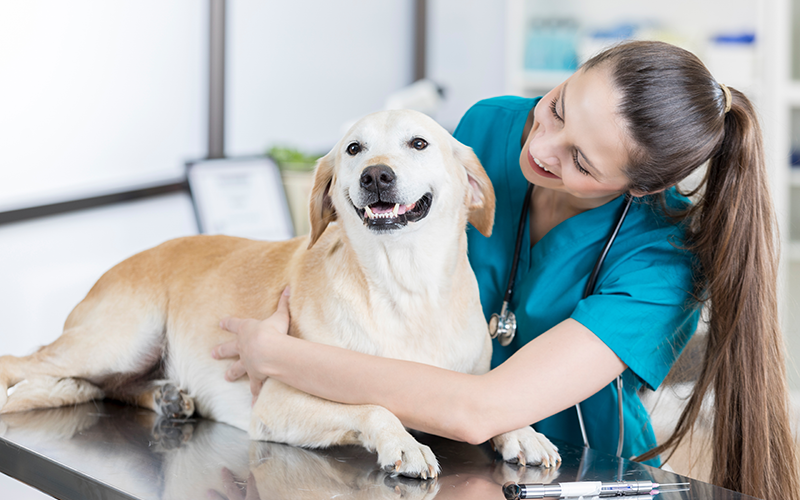In honor of Immunization Awareness Month, we’ve put together this blog you can share on your practice website, that highlights the importance of vaccinations for pet owners.
Check out out Facebook Live with Dr. Mark Stephenson discussing the importance of vaccinating your pets.
[arve url=”https://www.facebook.com/plugins/video.php?href=https%3A%2F%2Fwww.facebook.com%2FLifeLearnInc%2Fvideos%2F2171951576435631%2F&show_text=0&width=560″ /]Vaccinations help protect pets from the risk of potentially serious and even fatal diseases, like rabies. As well as protecting pets, vaccinations cost considerably less than treatment, and are far less stressful for pets and pet parents alike. Rabies, commonly carried by raccoons, skunks, bats, and foxes, reaches a seasonal peak in summer. State quarantine laws can require pets that have somehow come into contact with a rabid animal be placed in quarantine for up to six months at an approved animal control facility. This is at the owner’s expense. There can be many costs with not keeping your pet’s vaccines up to date. For diseases like rabies, it can even mean your pet’s life.
What Is a Vaccine? How Do Vaccines Work?
A vaccine is a preparation that helps the body’s immune system get ready to fight disease-causing organisms. If the immune system has “seen” an unfamiliar microbe (bacteria or virus) as part of a vaccine, it’s primed to produce antibodies if it “sees” (i.e. is exposed to) the same microbe again. Antibodies are what help the body fight infection and protect it from getting the same illness again. Vaccinations are intended to reduce the severity of the disease, and/or prevent the disease entirely, by creating immunity – and thus are often called immunizations.
Which Diseases in Pets Do We Have Vaccines For?
Vaccines are available to protect your pet against a wide variety of diseases. While vaccination programs have not (yet) eliminated these diseases, vaccines for rabies, distemper, parvovirus, feline leukemia and panleukopenia have greatly reduced the incidence of disease, improving pet health and welfare and preventing death.
One of the greatest achievement with the vaccination of our pets is the reduction of distemper in dogs, where vaccines are used. Canine distemper is a contagious, serious, and often fatal disease.
Another great achievement is the elimination of dog-mediated rabies (that is, rabies in people caused by dogs) in a number of countries, including Canada, the United States, western Europe, Japan, and 28 of the 35 Latin American countries. Rabies, however, is still widespread in more than 150 countries around the world. Even though it’s preventable, it kills about 59,000 people each year. Ninety-nine percent of these deaths are caused by dog bites and about 40% of the victims are children younger than 15 years of age, most commonly in Asia and Africa. United Against Rabies, a four-way partnership between the World Health Organization, the Food and Agriculture Organization, the World Organization for Animal Health, and the Global Alliance for Rabies Control, has set a goal to eliminate dog-mediated rabies by the year 2030.
What Vaccines Are Recommended for Dogs and Cats?
The vaccines that are recommended for dogs and cats vary according to where they live and their lifestyle. Some vaccines are “core,” recommended for all dogs or cats, while others are recommended only in special circumstances.
Core vaccines for dogs:
- Canine distemper virus
- Canine adenovirus-2 (canine hepatitis)
- Canine parvovirus
- Rabies virus
Non-core vaccines for dogs in special circumstances:
- Bordetella bronchiseptica + canine parainfluenza virus (kennel cough)
- Leptospira
- Borrelia burgdorferi or Lyme disease
- Canine influenza (H3N8 and H3N2)
Core vaccines for cats:
- Feline panleukopenia virus (FPL) (also known as feline infectious enteritis or feline distemper)
- Feline viral rhinotracheitis (also known as herpes virus-1 or FHV-1)
- Feline calicivirus
- Rabies virus
Non-core vaccines for cats in special circumstances:
- Chlamydophila felis
- Feline leukemia virus (FeLV)
- Feline infectious peritonitis (FIP) caused by FIP virus or feline coronavirus
- Bordetella bronchiseptica
- Feline immunodeficiency virus (FIV)
Are Vaccines Safe and Effective?
While some pet owners may be hesitant to vaccinate out of concerns about vaccine reactions or side-effects, the risks are very low (0.02% to 0.5% — i.e. less than 1%!) and far outweigh the risks associated with becoming sick with one of these preventable, and oftentimes deadly, diseases.
With advancements in research, and new technologies, vaccination guidelines have been changing. Historically, many vaccines were administered every year, but with what we now know about vaccine immunity (i.e. protection), the intervals between vaccinations are being extended. As more studies emerge on the immunity created by vaccines, and vaccines improve, the vaccination guidelines will continue to be revised accordingly. Your veterinarian will keep you up to date on the current standards.
Speak with your veterinarian about which vaccines your pet should receive and what schedule you should follow. This month check to make sure that your pet is up to date with all his or her vaccines!






